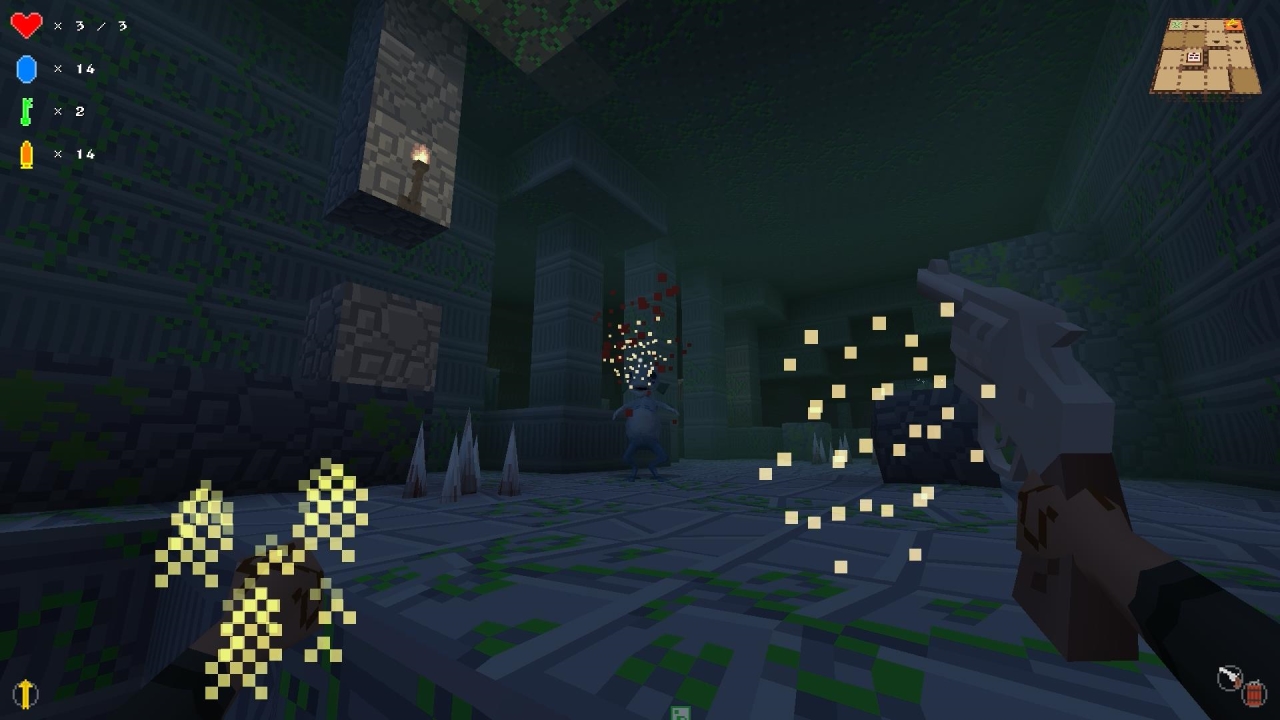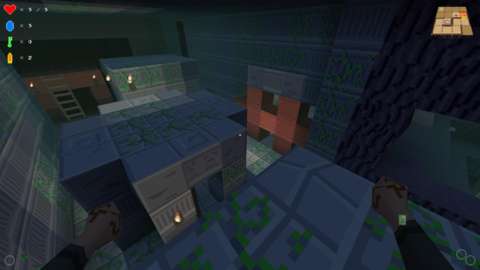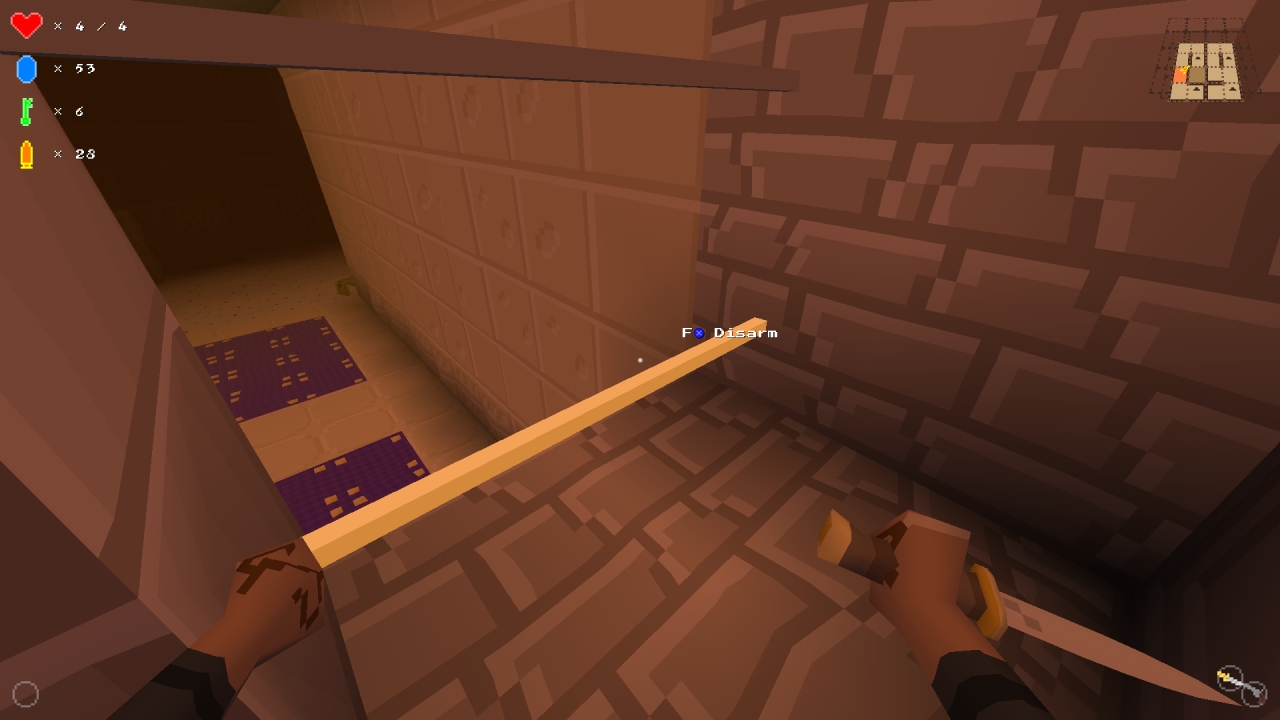I turned around a nearby corner and crouched low. I held my breath, praying that whatever was making that unearthly growl didn't spot me. In the mist-wrapped distance, I saw what appeared to be a way out, my chance to escape. Here I go, I thought to myself, and I moved from the uncertain shelter into the open. A noise to my right caught my attention. I turned and saw it, and it saw me. I was foolish to think I could escape the watch of something covered in eyes. I held my dagger in defense, but it was no use. Once more, the horrifying image materialized before me:
You died…Resurrect.
As is the nature of most roguelikes, one death in Eldritch means it's back to the beginning with a clear inventory. The fact lies heavily on your soul, and each room and hallway must be approached with caution. It's a world of gods and demons filled with traps and pitfalls, where even within unassuming statues hides killing intent.

The charming look of Eldritch's voxel-sculpted design is deceptive, for underneath its colorful veil lies one of the more frightening first-person games I've experienced in years. Inspired by the works of H.P. Lovecraft, Eldritch drops you in dark and dreary halls filled with gargling fishmen, chanting cultists, and squid-faced monstrosities. An eerie musical score combined with the groans and growls of enemies creates a haunting atmosphere. But it's not the creepy environment or some of the creatures that provide most of the tension. You will die in Eldritch. A lot. With one life separating success and failure, the mood remains tense. Sudden appearances from unseen enemies or hidden traps--many of which spell your doom--can cause you to jump in shock, and this is a game with plenty of shocks in store.

The four stages are connected to a library that acts as a safe haven where you can visit the bank, grab some health power-ups, and choose the next mission. Stages are randomized in Eldritch, so every adventure is different from the last, keeping the exploration fresh, and dying and restarting from getting too repetitive. Eldritch is not a pure roguelike; The game saves some progress, including cash held in your bank and the stages you have completed.
The art direction takes some cues from Minecraft, but Eldritch offers enough alterations to have a look and feel that it embraces as its own. Dagon's dungeon is composed of jagged, hand-cut stone, while purple drapes and carpeting adorn the arid realm of Nyarlathotep. Green mists and vaulted halls of the other domains lie beyond.
Beneath its simple aesthetic lies a deep strategy element. The game offers a surprising amount of movement freedom. You can sprint, crouch, lean around corners, and slide. Crouching low allows you to move around without making noise and alerting nearby foes, and leaning around corners keeps you in the shadows, letting you plot your move. But even with an arsenal of moves to deploy, interacting with enemies requires caution; death quickly follows the brazen adventurer. Charging a fireball-throwing lizardman with a dagger is a fast way to get zapped back to the library with nothing to show for your troubles. Striking from the dark dishes out more damage than fighting an enemy who is alerted to your presence.
With more experience, it becomes easier to navigate the stages, and powerful items found in shops deflate the game's difficulty.
You can only carry two weapons and equip one spell at a time. The setup is reminiscent of BioShock, which should come as no surprise seeing as one of the game's developers is David Pittman, a programmer for BioShock 2. The abilities strike a similar chord with 2K's underwater adventure, offering spells such as hypnotize, teleport, cloak, and more. Figuring out which weapons and abilities you need before spelunking into the darkness is key to survival in Eldritch.
The jumps and scares at the start of Eldritch are the best moments. Near the end, the game begins to lose its sense of impending peril; powerful enemies and traps become commonplace, replacing the once gripping fear with a feeling of listlessness. With more experience, it becomes easier to navigate the stages, and powerful items found in shops deflate the game's difficulty. During my final run, I could sprint through areas without making a sound. If I was unable to find a path to the exit, I merely blew a tunnel in the wall using a talisman that increases weapon damage. Locked doors don't hold a lot of significance when you can simply blast your way through. The high difficulty of roguelikes is one of the genre's most attractive features. Eldritch starts on the right track, but near the end, it loses its way.

Completing the game unlocks New Game Plus mode, which ramps up the difficulty. I didn't notice enemies becoming stronger in this mode, but the environments were far more dangerous, and stronger enemies that usually appeared near the end of a stage showed up right from the start. New Game Plus should offer hardcore roguelike fans the challenge they desire, but by then, it feels like too little, too late.
Eldritch does right with the revered Cthulhu mythos, bringing to life its sinister lore and pitting gamers against Lovecraft's insidious demons. Though a short ride, the game provides plenty of jumps and scares, just in time for Halloween.